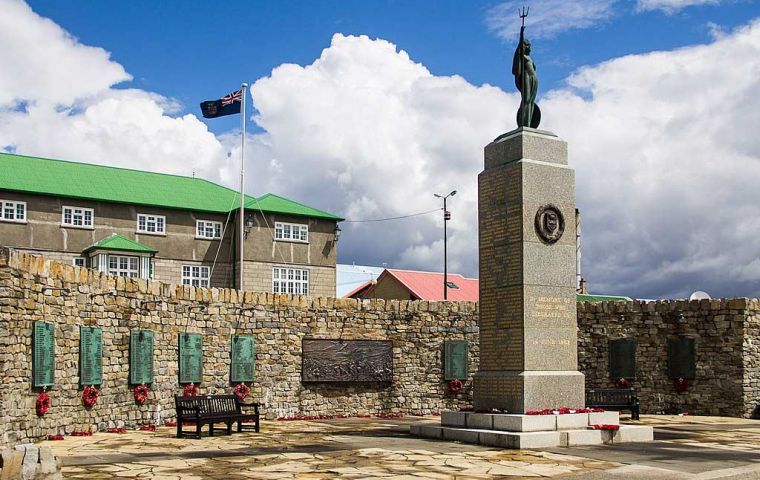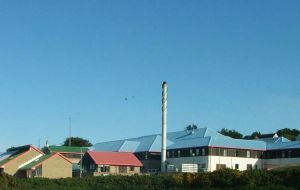MercoPress. South Atlantic News Agency
Forty Years on, the legacy of the Falklands War continues to show
 The liberation of the Falkland Islands came at a high price, and Falkland Islanders are acutely aware of this
The liberation of the Falkland Islands came at a high price, and Falkland Islanders are acutely aware of this  Over the last 40 years Islanders have worked to transform a country in decline to a modern, prosperous, self-sufficient, diverse, democratic, and open society.
Over the last 40 years Islanders have worked to transform a country in decline to a modern, prosperous, self-sufficient, diverse, democratic, and open society.  Islands that were once dependent on the UK for aid, are now self-sufficient in all areas apart from defense
Islands that were once dependent on the UK for aid, are now self-sufficient in all areas apart from defense In the 40th anniversary year of the Falklands War, Derek Twigg writes just how the legacy of the war continues to impact Islanders and Veterans 40 years on, and what the future holds for the Islands.
On the 2nd of April 1982, Argentine forces invaded and occupied the Falkland Islands. Three days later, on the 5th of April, a UK task force set sail to recapture the Islands and restore freedom to the Islanders.
25,984 UK Armed Forces personnel took part in the liberation of the Islands, of whom 255 paid the ultimate price. In addition, three civilian Falkland Islanders were killed during the war. Following several weeks of intense fighting, Argentine forces surrendered on the 14th of June 1982, a date that has since been known in the Falkland Islands as 'Liberation Day'.
Forty years on, many Falkland Islands still suffer the physical and mental scars following the events of 1982, and in some places the landscape is still recovering.
Following the War, over 120 areas were identified as hazardous, often because of minefields laid by the Argentines. Once popular beaches and other common land had to be fenced off and the lives of the Islands children were forever changed as they had to start attending routine sessions with the Ministry of Defense Explosive Ordnance Disposal detachment, to learn about the dangers of landmines and other suspicious devices.
In more recent years, diverse teams of deminers cleared an area equating to 28,800 football pitches, often by hand, removing a range of explosives. It was not until the 14th of November 2020, some 38 years after the very first Liberation Day, that the Falkland Islands were declared mine-free for the first time since 1982, and Islanders were able to reclaim land and beaches that had been inaccessible for a generation.
The majority of those deminers came from Zimbabwe and many fell in love with the Falklands and its people, some have even chosen to make the Falkland Islands their new home and have moved their families to join them. Whilst Islanders would rather the mines had never been laid in the first place, they are incredibly grateful to the UK Government and those who cleared them, and are delighted to welcome around 15 Zimbabwean families that now call the Falklands home.
When thinking about the legacy of the Falklands War, it is important not to forget those who fought to liberate the Islands, and as Chair of the Falkland Islands APPG, All Party Parliamentary Group), and as a former Veterans Minister, these people, along with the Islanders, are at the forefront of my mind in this anniversary year. The Falkland's APPG is one of the best supported and attended APPGs in Westminster, with very strong support from all political parties and both Houses of Parliament.
Falkland Islanders will be forever grateful for what the UK Armed Forces did in 1982 and 40 years on that gratitude has not dimmed. However, we must also remember that for many of the armed forces personnel who took part in the Falklands war they too live with their own legacy of 1982, whether that be physical or mental. In this 40th anniversary year, we must recommit ourselves to the care of all our veterans in need, and I pay tribute to organizations like the South Atlantic Medal Association and the Falklands Veterans Foundation, and the very specific work they do to support veterans of the Falklands War.
The liberation of the Falkland Islands came at a high price, and Falkland Islanders are acutely aware of this. As a people they have not wasted the freedom that was won for them, and over the last 40 years have worked incredibly hard to transform a country that was in decline to one that is now a modern, prosperous, self-sufficient, diverse, democratic, and open society.
Whilst the population of the Islands is still only 3,200, that is double what it was in 1982, and in this small population are represented 60 different nationalities. Islands that were once dependent on the UK for aid, are now self-sufficient in all areas apart from defense. Today, the Falkland Islands are at the forefront in the fight against climate change; they are a gateway to the Antarctic and a stepping off point for polar science. The relationship with the UK has also developed into a modern mutually beneficial partnership.
The 40th anniversary of the liberation of the Falkland Islands is therefore both an opportunity to commemorate the sacrifices of 1982 and also to celebrate the achievements of the last 40 years.
(*) Derek Twigg is the Labour MP for Halton, who he has represented since 1997, and is the Chair of the APPG for the Falkland Islands.




Top Comments
Disclaimer & comment rulesCommenting for this story is now closed.
If you have a Facebook account, become a fan and comment on our Facebook Page!